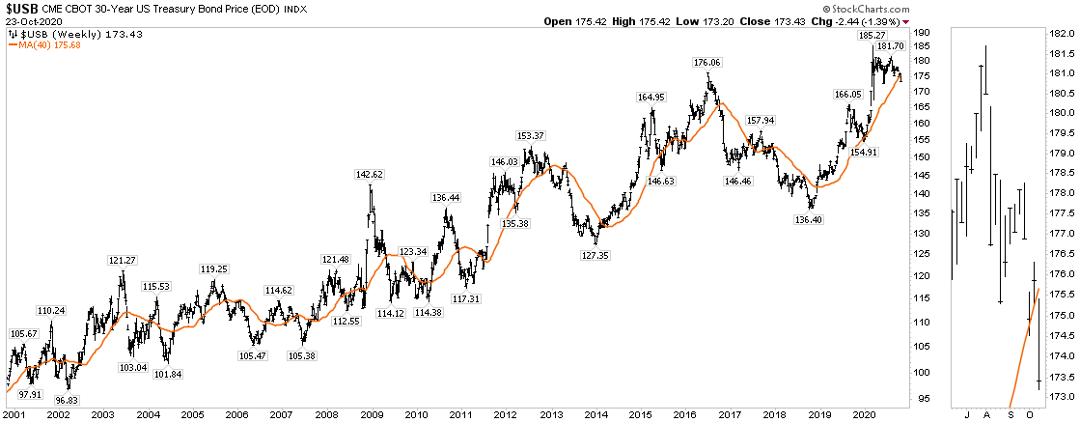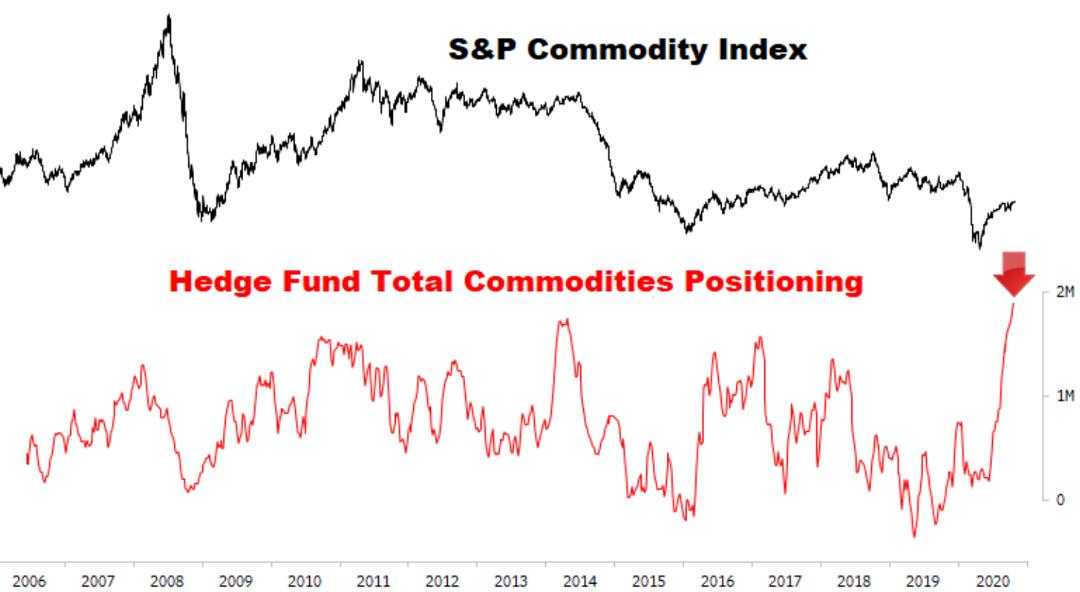I wrote about the record 30-year Treasury market COT on 10/8/20 (here), and am writing this to report another new record short position by the large specs. The latest COT report came out Friday, 10/23/20, and we learned that large speculators (hedge funds) have hit another record net short position. The chart below shows the COT positioning for the past 52 weeks (red bars are commercials and blue bars are large specs):
 courtesy of Software North, 10/24/20
courtesy of Software North, 10/24/20
Looking at this 20-year weekly chart of the US 30-year Treasury Bond (USB) you can see that, as October 23, 2020, the USB is sitting just below its 40-week moving average (equivalent to the 200-day moving average):
 courtesy of StockCharts.com, 10/24/20
courtesy of StockCharts.com, 10/24/20
Nothing has changed for me since I wrote last time that “The 200-DMA tends to be a demarcation line for bull/bear markets. Should USB break lower, then odds are it will continue to trade lower for a while. But I would argue that, with the massive net short position in the hedge fund community, odds favor USB finding support around this level and moving higher. If it does so, then long-term interest rates will continue their march lower. Time will tell, but it’s worth keeping an eye on since interest rates are a key driver across most other asset classes.”
What is also worth noting is that, with the hedge fund community carrying a record short 30-year bond position, they are also hold a record long position in commodities:
 courtesy of MacroCharts.com, 10/24/20
courtesy of MacroCharts.com, 10/24/20
It is pretty obvious that there are massive, record bets by the large speculative community that the reflation trade is going to work and inflation will be rising. Will the large specs actually get this right and will it be one of the rare instances when the “smart money” commercials are wrong? We will find out soon enough. One thing I have often seen in my 34 years around the markets – when the positions get as extreme as they are right now, odds favor a reversion to the mean. In this case, I would expect to see bonds rally, interest rates fall and commodities trade lower.
Please send any questions or comments to me at ttaschler@sprottglobal.com.
Tim Taschler, CMT
Sprott USA
Past performance does not guarantee future results. The views and opinions expressed herein are those of the author’s as of the date of this commentary and are subject to change without notice. This information is for information purposes only and is not intended to be an offer or solicitation for the sale of any financial product or service nor a recommendation or determination by Sprott Global Resource Investments Ltd. that any investment strategy is suitable for a specific investor. Investors should seek financial advice regarding the suitability of any investment strategy based on the objectives of the investor, financial situation, investment horizon and their particular needs. This information is not intended to provide financial, tax, legal, accounting or other professional advice, since such advice always requires consideration of individual circumstances. The products discussed herein are not insured by the FDIC or any other governmental agency, are subject to risks, including a possible loss of the principal amount invested.
Generally, natural resources investments are more volatile on a daily basis and have higher headline risk than other sectors, as they tend to be more sensitive to economic data, political and regulatory events as well as underlying commodity prices. Natural resource investments are influenced by the price of underlying commodities like oil, gas, metals, coal, etc., several of which trade on various exchanges and have price fluctuations based on short-term dynamics partly driven by demand/supply and also by investment flows. Natural resource investments tend to react more sensitively to global events and economic data than other sectors, whether it is a natural disaster like an earthquake, political upheaval in the Middle East or release of employment data in the U.S.. Low-priced securities can be very risky and may result in the loss of part or all of your investment. Because of significant volatility, large dealer spreads and very limited market liquidity, typically you will not be able to sell a low priced security immediately back to the dealer at the same price it sold the stock to you. In some cases, the stock may fall quickly in value. Investing in foreign markets may entail greater risks than those normally associated with domestic markets, such as political, currency, economic and market risks. You should carefully consider whether trading in low-priced and international securities is suitable for you in light of your circumstances and financial resources. Past performance is no guarantee of future returns. Sprott Global, entities that it controls, family, friends, employees, associates and others may hold positions in the securities it recommends to clients and may sell the same at any time. The author received no compensation for writing this article.